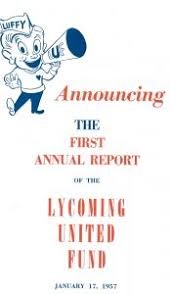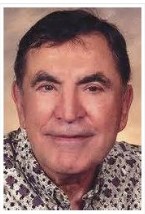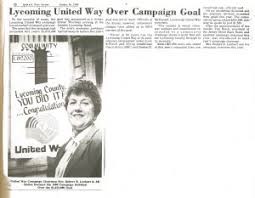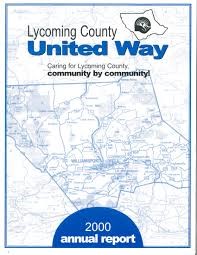
Luffy, the organization’s cheerleading mascot, spread the news of the first annual report issued in 1957.

Harry H. King, 1972 campaign chair, climbs the ladder to update thermometer sign at the corner of West Fourth and Pine Streets.
The United Fund was organized in response to the demand that all major health and welfare organizations’ appeals be combined into one federated fund raising campaign. The spirit of federation debuted in Lycoming County in 1922 with the establishment of the Williamsport Welfare Corporation.
Over the years, this federated effort has involved thousands of people who have enriched the quality of life in the county. It has taken on many names — Hughesville Community Chest, Jersey Shore Community Chest, Montgomery Community Chest, Montoursville Community Chest, Lycoming United Fund, and Lycoming United Way.
The development of the United Fund was spearheaded by the West Branch Manufacturer’s Association, the Chamber of Commerce, and organized labor and professional groups. After careful study, the Association unanimously endorsed and adopted the United Fund concept in 1956. The Association broadened the representation of the development group to include other citizens in the drafting of by-laws and nomination of directors and officers.
On May 23, 1956, the courts granted a charter and the Lycoming United Fund became a reality. The community declared that it chose to support private human services through federation, giving permission to the United Way to solicit funds for this purpose. No other human service organization was given such explicit license. The United Way was organized by the broad community to serve the community.

James J. Baggett was an instrumental force in the community development of United Way during his 30 years of service as executive director from 1960 – 1990.
In 1970, the National United Way logo was developed and in May of 1974 the Lycoming United Fund became the Lycoming United Way.
The Lycoming United Way evolved over the decades from raising funds to assessing community needs, and directing funds where most needed. The United Way is continually evolving toward a more responsive and inclusive community caring system.

Guided by the leadership of campaign chair Harriet Lenhart, 1980 marked the first time the annual campaign topped $1,000,000.
In April 2000, the Lycoming United Way became Lycoming County United Way, a new name for a community icon. Formally recognizing the growing support from businesses and individuals from all corners of the county, a formal name change from Lycoming United Way to Lycoming County United Way was instituted. With United Way services used yearly by county residents, the new name more accurately describes both who we are and whom we serve.
With the dawning of a new century LCUW initiatives were developed to address emerging needs of Lycoming County residents. The organization’s Community Assessment surveys identified a housing shortage and homelessness as concerns. Partnerships with YWCA, New Covenant United Church of Christ and the American Rescue Workers created the establishment of Liberty House (2002), Journey House (2007) and Saving Grace (2011). The programs provide both temporary shelter and case managements assistance to assist individuals with the tools to reach self-sufficiency.

What’s in a name? Founded in 1922, the organization was first known as the Community Chest. Over the years it became Lycoming County United Fund, Lycoming United Way and in 2000 officially became the Lycoming County United Way to reflect its mission of service to the entire Lycoming County community.
In 2007 the concept of Community Impact Funding was established. Recipients of LCUW funding were required to be serving an identified community need and report impacts as to how their efforts were improving lives. The funding model emphasizes the requirement that LCUW funds are directed to specific human service programs rather than as general funding to a specific agency.
In 2011 LCUW spearheaded the establishment of a 24-hour, 7-day a week 211 Human service Phone Network in Lycoming County to assist residents in obtaining human service program assistance. The toll free service is manned by trained individuals to provide responses to human service needs. The same year LCUW introduced an electronic online allocation system enabling human service programs to more efficiently process reports and requests for funding.
In 2014, responding to requests from Tioga and Sullivan counties, LCUW began procedures to assist those counties to raise human service funding for programs in their respective areas.
